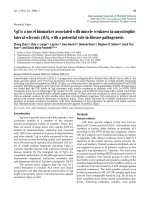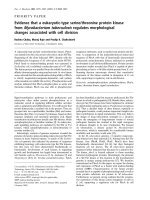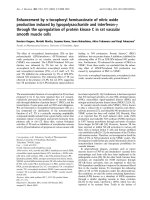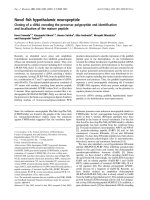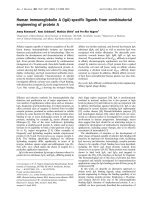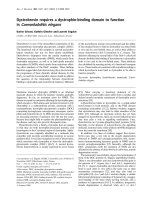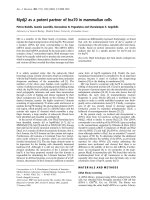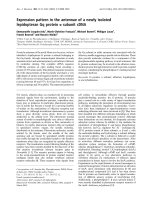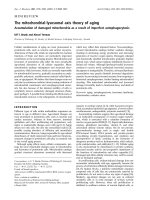Báo cáo y học: "Polyurethane sheet: A potential substitute of surgical cotton gauze" pps
Bạn đang xem bản rút gọn của tài liệu. Xem và tải ngay bản đầy đủ của tài liệu tại đây (449.27 KB, 2 trang )
LET T E R S TO THE EDITOR Open Access
Polyurethane sheet: A potential substitute of
surgical cotton gauze
Takeshi Shimamoto
Abstract
Polyurethane sheet is a pure white, soft, and flexible synthetic sponge with a mechanical strength and abrasion
resistance equivalent or even superior to other sponge materials. Our study indicates that the blood absorption
power of the polyurethane sheet is equivalent to that of the cotton gauze even after repeated use, and it has the
potential to decrease the total amount of sponge usage. Further, accurately identifying the bleeding point might
be easier with the polyurethane sheet.
Findings
Our study indicates that t he blood absorpt ion power of
the polyurethane sheet is equivalent to that of the cot-
ton gauze even after repeated use, and it has the poten-
tial to decrease the total amount of sponge usage.
Further, accurately identifying the bleeding point might
be easier with the polyurethane sheet.
Text
The uses of surgical gauze can be broadl y classified a s
absorption of blood and identification of the bleeding site.
In cardiothoracic surgery, significant amounts of gauze are
used in each case because once a gauze piece gets soaked
in blood, it never regains its original whiteness and its
absorption power despite a thorough rinse with water and
a subsequent squeeze. Its consumption may increase enor-
mously, particularly during aortic surgeries that involve
intractable bleedings. In such case s, counting the used
gauze pieces before wound closure might be troublesome
for the nursing staff or surgical technicians; as a result, the
count can be inaccurate and cause potential postoperative
accidental sponge retention [1].
Polyurethane sheet is a pure white, soft, and flexible
synthetic sponge with a mechanical strength and abra-
sion resistance equivalent or even superior to other
sponge materials. It is stable against acidic or alkaline
detergents. Since no toxic agents such as formalin are
used during its manufacture, its intraoperative use is
considered safe.
The major advantage of polyurethane sheet is its ability
to retain fluid even after repeated use. To investigate the
feasibility of its use as surgical gauze, 6 pairs of conven-
tional cotton surgical gauze (EB sterile; Kawamoto Cor-
poration, Osaka) and 2-mm-thick polyurethane sheet
(Sofrous SK; Aion Corporation, Osaka) were compared.
Both these sponges, which had identical weight, were
prepared as 15 × 15-cm pieces, and then soaked in canine
heparinized blood. The absorption ratio (weight of the
maximum blood absorbed by the sponge/dry weight of
the sponge.) was 6.13 ± 0.16 for th e cotton sponge and
6.49 ± 0.18 for the polyurethane sheet; the difference was
not statistically signific ant (Mann-Whitney U test; SPSS
®
version 10; Illinois, Chicago). The polyurethane sheets
were then rinsed with 500 cc of water, squeezed manu-
ally, and resoaked in the canine heparinized blood. This
procedure was repeated 10 times without changing the
water used for rinsing. At this stage, the absorption ratio
for the polyurethane sheet was 6.55 ± 0.28 (the difference
was not significant when compared with the absorption
ratios of the sheet when first used and of the cotton
gauze), indicating that the blood absorption power of the
sheet remained unchanged even after repeated use and
was equivalent to that of the cotton gauze. Moreover, the
whiteness of the sheet was almost completely maintained
after rinsing and squeezing (Figure 1a). Subsequently,
4 drops (0.1 cc each) of blood were dropped on both the
materials at 2-cm intervals, and the manner of blood
spread was observed: the spread was lesser and the
demarcation was more evident on the polyurethane sheet
(Figure 1b,1c).
Correspondence:
Department of Cardiovascular Surgery, Kurashiki Central Hospital,Kurashiki,
Japan
Shimamoto Journal of Cardiothoracic Surgery 2011, 6:26
/>© 2011 Shimamoto; licensee BioMed Central Ltd. This is an Open Access article distributed under the terms of the Creative Commons
Attribution License (http://crea tivecomm ons.org/licenses/by/2.0), which permits unrestricted use, distribution, and reproduction in
any medium, prov ided the orig inal work is properly cited.
This study indicates that the blood absorption power
of the polyurethane sheet is equivalent to that of the
cotton gauze even after repeated use, and it has the
potential to decrease the total amount of sponge usage.
Further, accurately identifying the bleeding point might
be easier with the polyurethane sheet. Although a future
study regarding the safety and feasibility of reuse is war-
ranted, polyurethane sheets may function as a substitute
of conventional surgical gauze, thus facilitating a more
efficient surgery.
Competing interests
None: Dr.Shimamoto has no commercial or financial relationship with any
company manufacturing polyurethane sheet, and swear that this study was
conducted from his own scientific interest.
Received: 14 February 2011 Accepted: 7 March 2011
Published: 7 March 2011
Reference
1. Lincourt AE, Harrell A, Cristiano J, Sechrist C, Kercher K, Heniford BT:
Retained foreign bodies after surgery. J Surg Res 2007, 138:170-4.
doi:10.1186/1749-8090-6-26
Cite this article as: Shimamoto: Polyurethane sheet: A potential
substitute of surgical cotton gauze. Journal of Cardiothoracic Surgery 2011
6:26.
Submit your next manuscript to BioMed Central
and take full advantage of:
• Convenient online submission
• Thorough peer review
• No space constraints or color figure charges
• Immediate publication on acceptance
• Inclusion in PubMed, CAS, Scopus and Google Scholar
• Research which is freely available for redistribution
Submit your manuscript at
www.biomedcentral.com/submit
Figure 1 (a) An unused surgical cotton g auze (left), unused
polyurethane sheet (center), and polyurethane sheet subjected
to the blood-soak and water-rinse procedure 10 times (right).
Note that the polyurethane sheet retains sufficient whiteness even
after repeated use. Four drops (0.1 cc each) of blood were dropped
at 2-cm intervals on a new surgical cotton gauze (b) and a
polyurethane sheet that was used 10 times (c). Note that the spread
of the blood is lesser on the polyurethane sheet.
Shimamoto Journal of Cardiothoracic Surgery 2011, 6:26
/>Page 2 of 2

